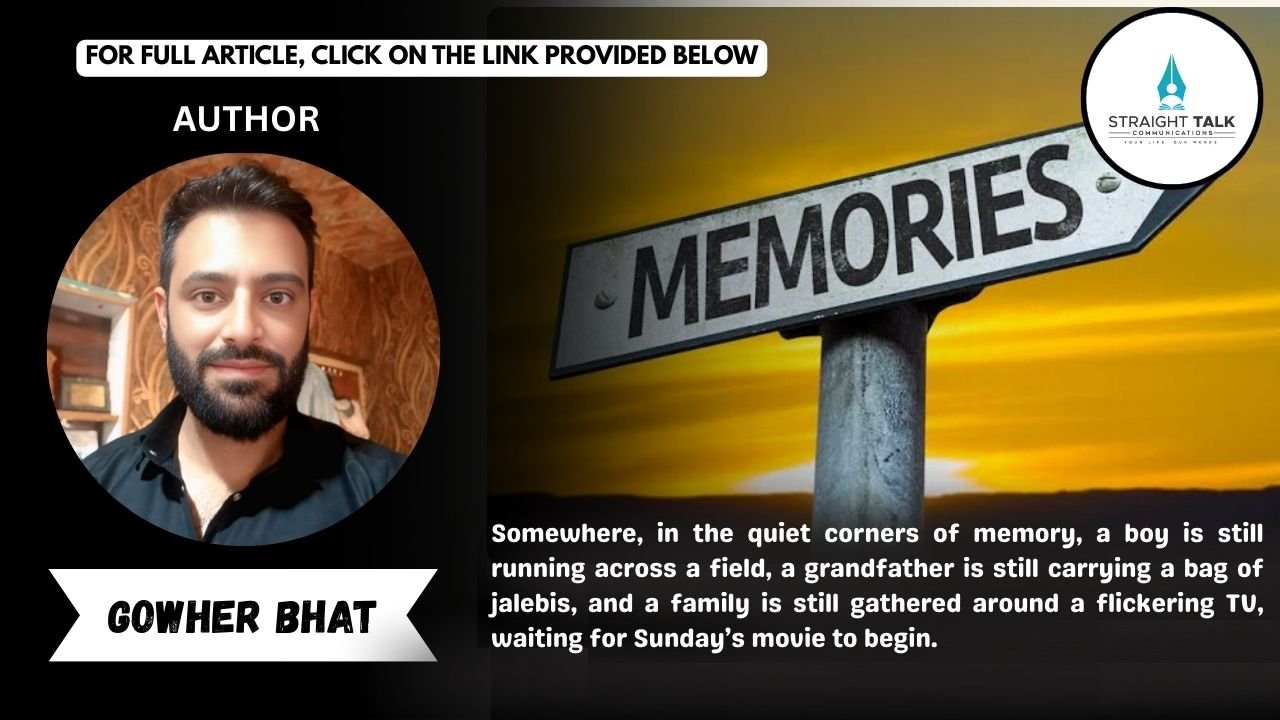Memories That Refuse to Fade

Somewhere, in the quiet corners of memory, a boy is still running across a field, a grandfather is still carrying a bag of jalebis, and a family is still gathered around a flickering TV, waiting for Sunday’s movie to begin.
Gowher Bhat
There are certain days from the past that sit quietly in the mind. They don’t shout, they don’t demand attention, but when you least expect it, they return. A field. A lane. A cool breeze through a summer afternoon. The smell of vegetables pulled fresh from the earth. These are not grand memories, not the kind that enter history books. They are small, fleeting things. Yet, they are the ones that refuse to fade.
I grew up when cities were smaller, calmer, less frantic. A child could still walk through fields and return before dusk. The fields weren’t far, but to a child’s eyes they seemed like another country. Each Saturday, we walked to the next locality. It was routine, yet it never felt like a burden. The walk itself was joy—feet pressing soil, wind carrying the earth’s shifting scent, sometimes sweet, sometimes raw.
The mosque was always the destination, but the journey was the point. Skipping beside my parents across open ground, under wide skies, I felt free. Today, the distance seems short. But memory does not measure in kilometres. Memory measures in wonder.
When colonies rose and houses pressed in, I tried to retrace those paths. But I couldn’t. The fields were gone, the open ground shrunk. The mosque still stood, yet the approach was altered. Memory and present stood side by side, but they did not greet each other.
Later, in another city, we walked each week through an agricultural island. Farmers grew seasonal vegetables there. The tang of raw tomatoes lingered—sharp, alive on the tongue. Even now, if I close my eyes, I can feel that taste spark against my palate.
Summers meant my grandparents’ home in a quiet civil lines lane. Shopkeepers lined both sides with trays of sweets and savouries. Fried kachoris, syrupy jalebis, spicy pakoras—all part of the landscape. Each morning, my grandfather returned with bags full of snacks, as though feeding us gave him strength. From him, I learnt that love need not be spoken; sometimes it is served on a plate.
Public transport shaped much of my childhood. Matadors and buses were our rides, not trains. They were always crowded—ten seats holding twenty people, the conductor shouting routes at every stop. We pressed against windows, warm wind rushing in, strangers squeezed shoulder to shoulder, yet somehow conversations flowed. A stranger would ask where you studied, another would crack a joke, and by the time you stepped down, you had shared more than just space—you had shared a slice of life. The journey itself felt like an adventure.
Evenings carried their own rhythm. Families gathered around the TV for Doordarshan—Chitrahaar on Wednesdays, Sunday movies, or cricket commentary that made whole neighbourhoods erupt with cheers. The screen was small, the reception often grainy, but the excitement was boundless. Sometimes the power would cut, as it often did, and we would shift to the radio. The hiss of static would break into a Kashmiri folk song, or a commentary voice that painted images sharper than television ever could.
Winters had a different memory. Nights were long, snow pressed against windows, and lanterns flickered dimly. We huddled close to kangris, coal glowing inside. Grandparents told stories—some of faith, some of folklore, some simply to pass the time. Outside, snow thickened the silence. Inside, warmth and words created a world of their own. Those nights still live deep within me, carrying the taste of dried turnips, the crackle of coal, the smell of burning chinar leaves.
Life was slower then. We could lie on the grass and watch clouds shift shapes—an animal, a face, a bird, and then gone. Airplanes were rare, and when one did pass, we stared until its trail dissolved. Entertainment cost nothing. The sky gave it free.
Now, in a world that races faster each year, these memories return uninvited. They come when deadlines mount, when phones don’t stop ringing, when the city presses in from all sides. Suddenly, an image flashes—me running across a field, my parents beside me, the sky wide, the earth open. For a moment, everything slows.
Psychologists may explain this with chemicals—endorphins, dopamine, serotonin. But to me, memories are simpler. They are a relief valve. They remind us we are not only the present. We are also the child with mango juice dripping down his arm, the teenager pressing against a matador window, the boy who believed clouds could be anything.
When I share such memories, I see faces soften. Others, too, carry them—of a grandmother’s kitchen, a village festival, a walk to school. They may not speak of them often, but when they do, their voices change. Nostalgia enters the room. We dismiss such recollections as trivial. They are not. They steady us. They remind us of belonging, of times when life was less about running and more about being.
Not all memories are sweet; some sting. Some are tangled with regret. Yet even they carry meaning. They prove we have lived, that we have passed through seasons. Stories, even painful ones, keep us human.
Children today may never sit in a matador with twenty people squeezed together, never wait for Doordarshan’s Sunday movie, never huddle around a kangri during a snowstorm. Their memories will be different—of touchscreens, instant messages, bright malls. Yet I hope they too will find their own small anchors, their own pressure valves to steady them when life feels overwhelming.
We do not need big events to make sense. Life often hides its treasure in ordinary corners: a walk with parents, a meal with grandparents, a crowded bus ride, a summer sky. Years later, these become the anchors that hold us.
Perhaps this is why memories refuse to fade—not because they are extraordinary, but because they hold the ordinary moments that made us who we are. They return when we need them most, reminding us that even in a rushing world, there was a time when life was slower, and joy was simpler.
The world will keep rushing. Cities will keep crowding. Deadlines will not disappear. But somewhere, in the quiet corners of memory, a boy is still running across a field, a grandfather is still carrying a bag of jalebis, and a family is still gathered around a flickering TV, waiting for Sunday’s movie to begin. Those memories refuse to fade. And I am grateful they don’t.
(Gowher Bhat is a published author, freelance journalist, book reviewer, and educator based in Kashmir.)







